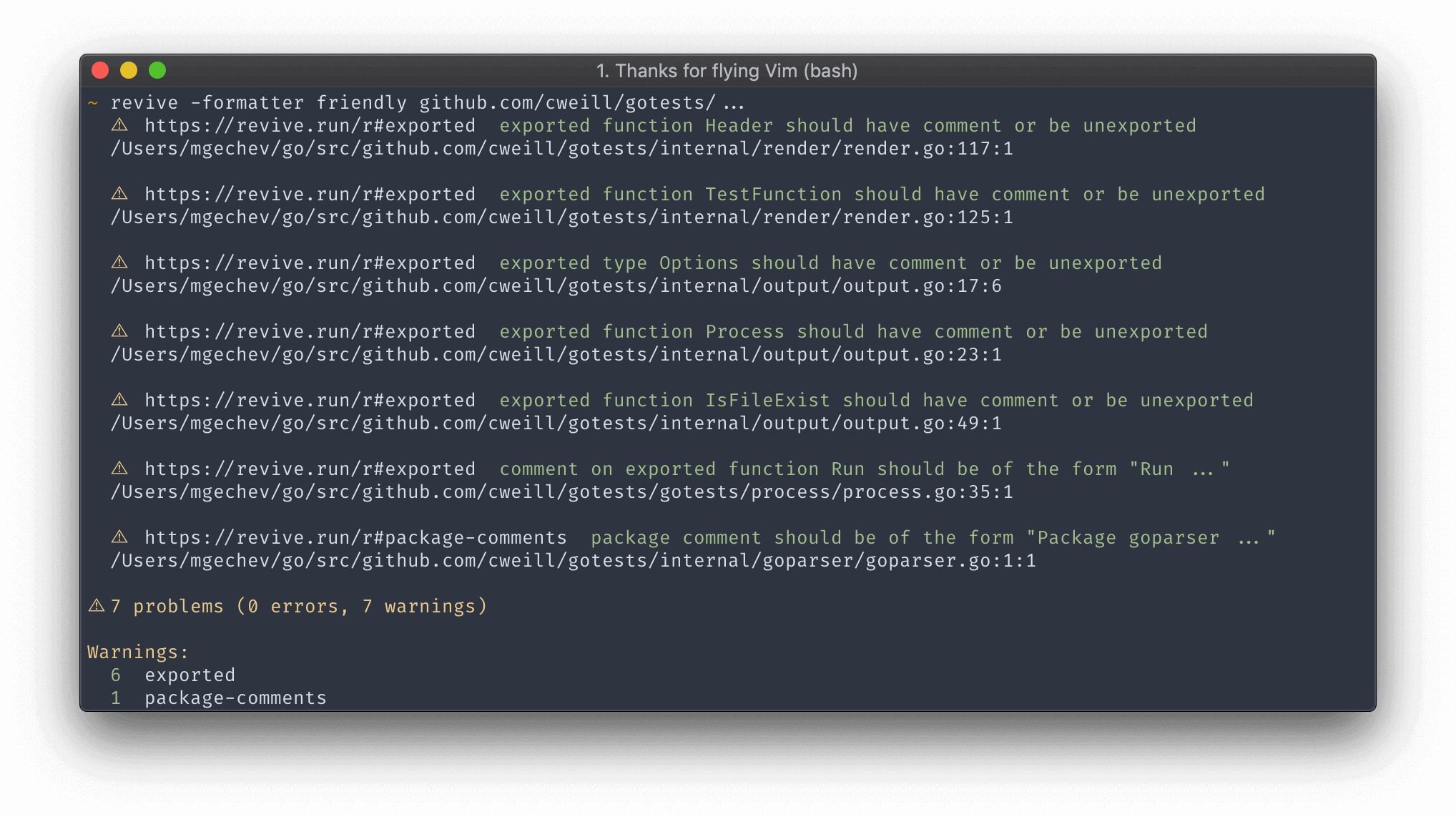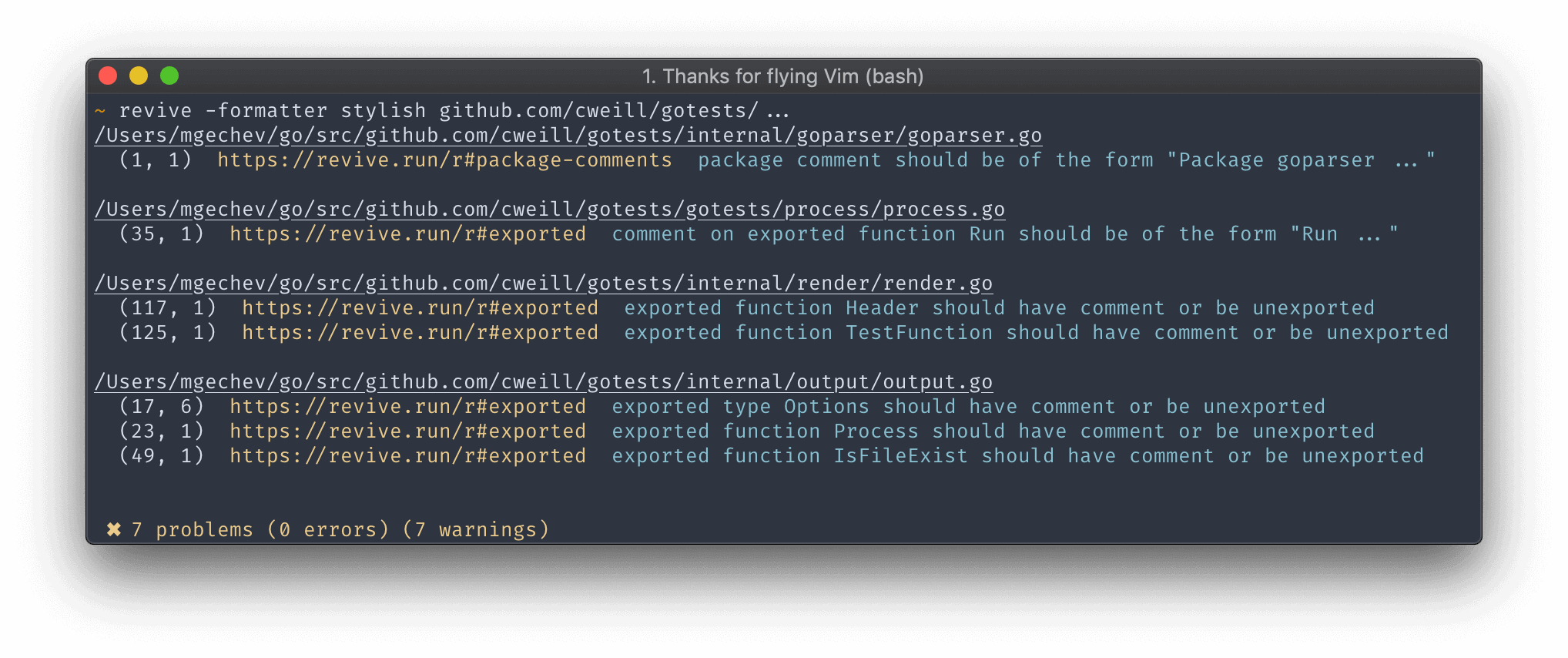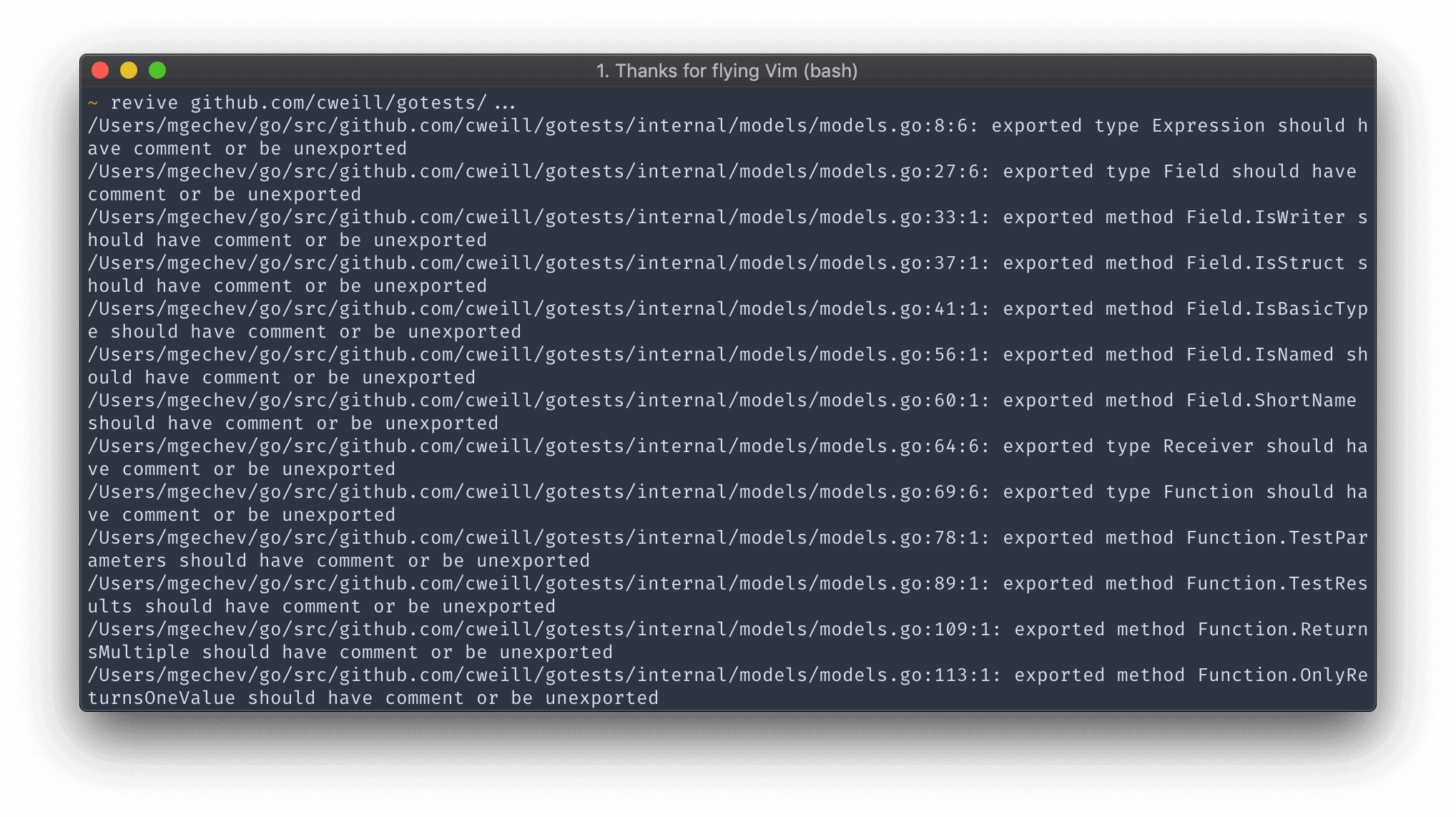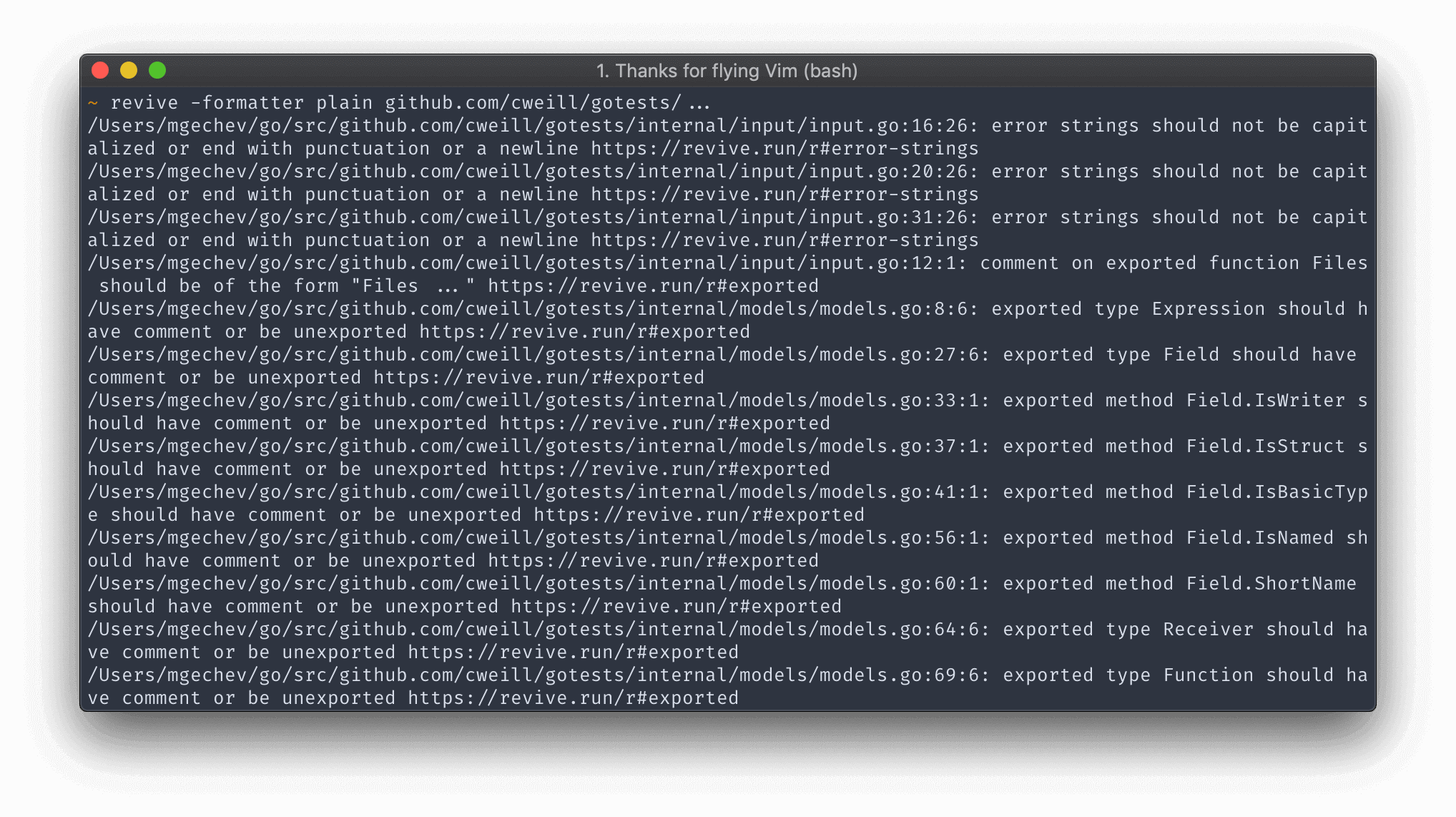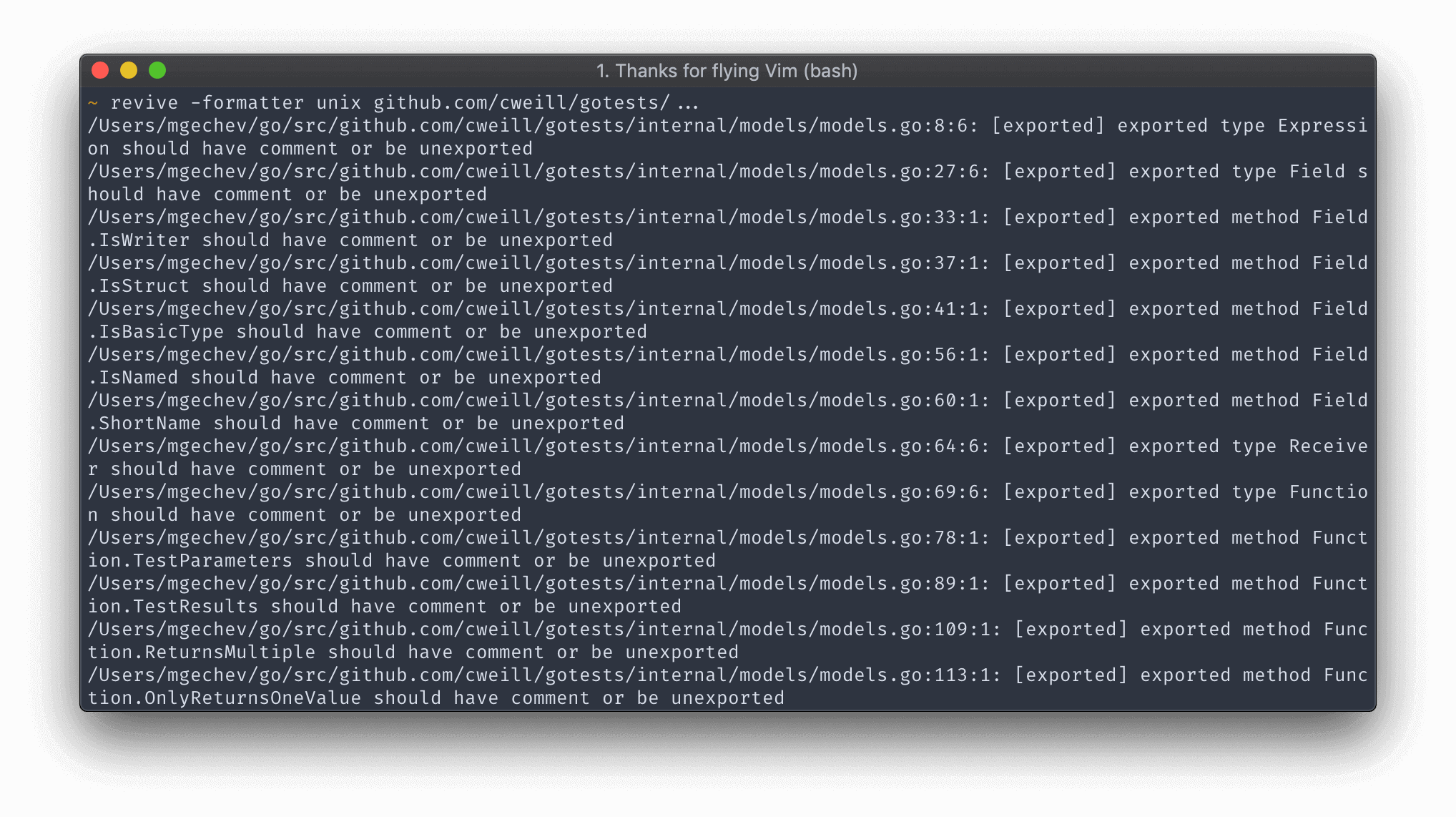32 KiB
revive
Fast, configurable, extensible, flexible, and beautiful linter for Go. Drop-in replacement of golint. Revive provides a framework for development of custom rules, and lets you define a strict preset for enhancing your development & code review processes.

Logo by Georgi Serev
Here's how revive is different from golint:
- Allows to enable or disable rules using a configuration file.
- Allows to configure the linting rules with a TOML file.
- 2x faster running the same rules as golint.
- Provides functionality for disabling a specific rule or the entire linter for a file or a range of lines.
golintallows this only for generated files.
- Optional type checking. Most rules in golint do not require type checking. If you disable them in the config file, revive will run over 6x faster than golint.
- Provides multiple formatters which let us customize the output.
- Allows to customize the return code for the entire linter or based on the failure of only some rules.
- Everyone can extend it easily with custom rules or formatters.
Reviveprovides more rules compared togolint.
Who uses Revive
tidb- TiDB is a distributed HTAP database compatible with the MySQL protocolgrafana- The tool for beautiful monitoring and metric analytics & dashboards for Graphite, InfluxDB & Prometheus & Moreetcd- Distributed reliable key-value store for the most critical data of a distributed systemferret- Declarative web scrapinggopass- The slightly more awesome standard unix password manager for teamsgitea- Git with a cup of tea, painless self-hosted git serviceexcelize- Go library for reading and writing Microsoft Excel™ (XLSX) filesaurora- aurora is a web-based Beanstalk queue server console written in Gosoar- SQL Optimizer And Rewritergorush- A push notification server written in Go (Golang)adry- dry - A Docker manager for the terminal.go-echarts- The adorable charts library for Golangreviewdog- Automated code review tool integrated with any code analysis tools regardless of programming languagerudder-server- Privacy and Security focused Segment-alternative, in Golang and React.sklearn- A partial port of scikit-learn written in Go.protoc-gen-doc- Documentation generator plugin for Google Protocol Buffers.llvm- Library for interacting with LLVM IR in pure Go.jenkins-library- Jenkins shared library for Continuous Delivery pipelines by SAP.pd- Placement driver for TiKV.shellhub- ShellHub enables teams to easily access any Linux device behind firewall and NAT.lorawan-stack- The Things Network Stack for LoRaWAN V3gin-jwt- This is a JWT middleware for Gin framework.gofight- Testing API Handler written in Golang.Beaver- A Real Time Messaging Server.ggz- An URL shortener service written in GolangCodeac.io- Automated code review service integrates with GitHub, Bitbucket and GitLab (even self-hosted) and helps you fight technical debt.
Open a PR to add your project.
- revive
Usage
Since the default behavior of revive is compatible with golint, without providing any additional flags, the only difference you'd notice is faster execution.
revive supports a -config flag whose value should correspond to a TOML file describing which rules to use for revive's linting. If not provided, revive will try to use a global config file (assumed to be located at $HOME/revive.toml). Otherwise, if no configuration TOML file is found then revive uses a built-in set of default linting rules.
Bazel
If you want to use revive with Bazel, take a look at the rules that Atlassian maintains.
Text Editors
- Support for VSCode in vscode-go.
- Support for Atom via linter-revive.
- Support for vim via dense-analysis/ale.
let g:ale_linters = {
\ 'go': ['revive'],
\}
GitHub Actions
- Revive Action with annotation support
Continuous Integration
Codeac.io - Automated code review service integrates with GitHub, Bitbucket and GitLab (even self-hosted) and helps you fight technical debt. Check your pull-requests with revive automatically. (free for open-source projects)
Installation
go get -u github.com/mgechev/revive
Command Line Flags
revive accepts three command line parameters:
-
-config [PATH]- path to config file in TOML format, defaults to$HOME/revive.tomlif present. -
-exclude [PATTERN]- pattern for files/directories/packages to be excluded for linting. You can specify the files you want to exclude for linting either as package name (i.e.github.com/mgechev/revive), list them as individual files (i.e.file.go), directories (i.e../foo/...), or any combination of the three. -
-formatter [NAME]- formatter to be used for the output. The currently available formatters are:default- will output the failures the same way thatgolintdoes.json- outputs the failures in JSON format.ndjson- outputs the failures as stream in newline delimited JSON (NDJSON) format.friendly- outputs the failures when found. Shows summary of all the failures.stylish- formats the failures in a table. Keep in mind that it doesn't stream the output so it might be perceived as slower compared to others.checkstyle- outputs the failures in XML format compatible with that of Java's Checkstyle.
Sample Invocations
revive -config revive.toml -exclude file1.go -exclude file2.go -formatter friendly github.com/mgechev/revive package/...
- The command above will use the configuration from
revive.toml revivewill ignorefile1.goandfile2.go- The output will be formatted with the
friendlyformatter - The linter will analyze
github.com/mgechev/reviveand the files inpackage
Comment Directives
Using comments, you can disable the linter for the entire file or only range of lines:
//revive:disable
func Public() {}
//revive:enable
The snippet above, will disable revive between the revive:disable and revive:enable comments. If you skip revive:enable, the linter will be disabled for the rest of the file.
With revive:disable-next-line and revive:disable-line you can disable revive on a particular code line.
You can do the same on a rule level. In case you want to disable only a particular rule, you can use:
//revive:disable:unexported-return
func Public() private {
return private
}
//revive:enable:unexported-return
This way, revive will not warn you for that you're returning an object of an unexported type, from an exported function.
You can document why you disable the linter by adding a trailing text in the directive, for example
//revive:disable Until the code is stable
//revive:disable:cyclomatic High complexity score but easy to understand
You can also configure revive to enforce documenting linter disabling directives by adding
[directive.specify-disable-reason]
in the configuration. You can set the severity (defaults to warning) of the violation of this directive
[directive.specify-disable-reason]
severity = "error"
Configuration
revive can be configured with a TOML file. Here's a sample configuration with explanation for the individual properties:
# When set to false, ignores files with "GENERATED" header, similar to golint
ignoreGeneratedHeader = true
# Sets the default severity to "warning"
severity = "warning"
# Sets the default failure confidence. This means that linting errors
# with less than 0.8 confidence will be ignored.
confidence = 0.8
# Sets the error code for failures with severity "error"
errorCode = 0
# Sets the error code for failures with severity "warning"
warningCode = 0
# Configuration of the `cyclomatic` rule. Here we specify that
# the rule should fail if it detects code with higher complexity than 10.
[rule.cyclomatic]
arguments = [10]
# Sets the severity of the `package-comments` rule to "error".
[rule.package-comments]
severity = "error"
Default Configuration
The default configuration of revive can be found at defaults.toml. This will enable all rules available in golint and use their default configuration (i.e. the way they are hardcoded in golint).
revive -config defaults.toml github.com/mgechev/revive
This will use the configuration file defaults.toml, the default formatter, and will run linting over the github.com/mgechev/revive package.
Custom Configuration
revive -config config.toml -formatter friendly github.com/mgechev/revive
This will use config.toml, the friendly formatter, and will run linting over the github.com/mgechev/revive package.
Recommended Configuration
The following snippet contains the recommended revive configuration that you can use in your project:
ignoreGeneratedHeader = false
severity = "warning"
confidence = 0.8
errorCode = 0
warningCode = 0
[rule.blank-imports]
[rule.context-as-argument]
[rule.context-keys-type]
[rule.dot-imports]
[rule.error-return]
[rule.error-strings]
[rule.error-naming]
[rule.exported]
[rule.if-return]
[rule.increment-decrement]
[rule.var-naming]
[rule.var-declaration]
[rule.package-comments]
[rule.range]
[rule.receiver-naming]
[rule.time-naming]
[rule.unexported-return]
[rule.indent-error-flow]
[rule.errorf]
[rule.empty-block]
[rule.superfluous-else]
[rule.unused-parameter]
[rule.unreachable-code]
[rule.redefines-builtin-id]
Available Rules
List of all available rules. The rules ported from golint are left unchanged and indicated in the golint column.
| Name | Config | Description | golint |
Typed |
|---|---|---|---|---|
context-keys-type |
n/a | Disallows the usage of basic types in context.WithValue. |
yes | yes |
time-naming |
n/a | Conventions around the naming of time variables. | yes | yes |
var-declaration |
n/a | Reduces redundancies around variable declaration. | yes | yes |
unexported-return |
n/a | Warns when a public return is from unexported type. | yes | yes |
errorf |
n/a | Should replace errors.New(fmt.Sprintf()) with fmt.Errorf() |
yes | yes |
blank-imports |
n/a | Disallows blank imports | yes | no |
context-as-argument |
n/a | context.Context should be the first argument of a function. |
yes | no |
dot-imports |
n/a | Forbids . imports. |
yes | no |
error-return |
n/a | The error return parameter should be last. | yes | no |
error-strings |
n/a | Conventions around error strings. | yes | no |
error-naming |
n/a | Naming of error variables. | yes | no |
exported |
n/a | Naming and commenting conventions on exported symbols. | yes | no |
if-return |
n/a | Redundant if when returning an error. | yes | no |
increment-decrement |
n/a | Use i++ and i-- instead of i += 1 and i -= 1. |
yes | no |
var-naming |
whitelist & blacklist of initialisms | Naming rules. | yes | no |
package-comments |
n/a | Package commenting conventions. | yes | no |
range |
n/a | Prevents redundant variables when iterating over a collection. | yes | no |
receiver-naming |
n/a | Conventions around the naming of receivers. | yes | no |
indent-error-flow |
n/a | Prevents redundant else statements. | yes | no |
argument-limit |
int | Specifies the maximum number of arguments a function can receive | no | no |
cyclomatic |
int | Sets restriction for maximum Cyclomatic complexity. | no | no |
max-public-structs |
int | The maximum number of public structs in a file. | no | no |
file-header |
string | Header which each file should have. | no | no |
empty-block |
n/a | Warns on empty code blocks | no | yes |
superfluous-else |
n/a | Prevents redundant else statements (extends indent-error-flow) |
no | no |
confusing-naming |
n/a | Warns on methods with names that differ only by capitalization | no | no |
get-return |
n/a | Warns on getters that do not yield any result | no | no |
modifies-parameter |
n/a | Warns on assignments to function parameters | no | no |
confusing-results |
n/a | Suggests to name potentially confusing function results | no | no |
deep-exit |
n/a | Looks for program exits in funcs other than main() or init() |
no | no |
unused-parameter |
n/a | Suggests to rename or remove unused function parameters | no | no |
unreachable-code |
n/a | Warns on unreachable code | no | no |
add-constant |
map | Suggests using constant for magic numbers and string literals | no | no |
flag-parameter |
n/a | Warns on boolean parameters that create a control coupling | no | no |
unnecessary-stmt |
n/a | Suggests removing or simplifying unnecessary statements | no | no |
struct-tag |
n/a | Checks common struct tags like json,xml,yaml |
no | no |
modifies-value-receiver |
n/a | Warns on assignments to value-passed method receivers | no | yes |
constant-logical-expr |
n/a | Warns on constant logical expressions | no | no |
bool-literal-in-expr |
n/a | Suggests removing Boolean literals from logic expressions | no | no |
redefines-builtin-id |
n/a | Warns on redefinitions of builtin identifiers | no | no |
function-result-limit |
int | Specifies the maximum number of results a function can return | no | no |
imports-blacklist |
[]string | Disallows importing the specified packages | no | no |
range-val-in-closure |
n/a | Warns if range value is used in a closure dispatched as goroutine | no | no |
range-val-address |
n/a | Warns if address of range value is used dangerously | no | no |
waitgroup-by-value |
n/a | Warns on functions taking sync.WaitGroup as a by-value parameter | no | no |
atomic |
n/a | Check for common mistaken usages of the sync/atomic package |
no | no |
empty-lines |
n/a | Warns when there are heading or trailing newlines in a block | no | no |
line-length-limit |
int | Specifies the maximum number of characters in a line | no | no |
call-to-gc |
n/a | Warns on explicit call to the garbage collector | no | no |
duplicated-imports |
n/a | Looks for packages that are imported two or more times | no | no |
import-shadowing |
n/a | Spots identifiers that shadow an import | no | no |
bare-return |
n/a | Warns on bare returns | no | no |
unused-receiver |
n/a | Suggests to rename or remove unused method receivers | no | no |
unhandled-error |
[]string | Warns on unhandled errors returned by funcion calls | no | yes |
cognitive-complexity |
int | Sets restriction for maximum Cognitive complexity. | no | no |
string-of-int |
n/a | Warns on suspicious casts from int to string | no | yes |
early-return |
n/a | Spots if-then-else statements that can be refactored to simplify code reading | no | no |
unconditional-recursion |
n/a | Warns on function calls that will lead to (direct) infinite recursion | no | no |
identical-branches |
n/a | Spots if-then-else statements with identical then and else branches |
no | no |
defer |
map | Warns on some defer gotchas | no | no |
unexported-naming |
n/a | Warns on wrongly named un-exported symbols | no | no |
Configurable rules
Here you can find how you can configure some of the existing rules:
var-naming
This rule accepts two slices of strings, a whitelist and a blacklist of initialisms. By default the rule behaves exactly as the alternative in golint but optionally, you can relax it (see golint/lint/issues/89)
[rule.var-naming]
arguments = [["ID"], ["VM"]]
This way, revive will not warn for identifier called customId but will warn that customVm should be called customVM.
Available Formatters
This section lists all the available formatters and provides a screenshot for each one.
Friendly
Stylish
Default
The default formatter produces the same output as golint.
Plain
The plain formatter produces the same output as the default formatter and appends URL to the rule description.
Unix
The unix formatter produces the same output as the default formatter but surrounds the rules in [].
Extensibility
The tool can be extended with custom rules or formatters. This section contains additional information on how to implement such.
To extend the linter with a custom rule or a formatter you'll have to push it to this repository or fork it. This is due to the limited -buildmode=plugin support which works only on Linux (with known issues).
Custom Rule
Each rule needs to implement the lint.Rule interface:
type Rule interface {
Name() string
Apply(*File, Arguments) []Failure
}
The Arguments type is an alias of the type []interface{}. The arguments of the rule are passed from the configuration file.
Example
Let's suppose we have developed a rule called BanStructNameRule which disallow us to name a structure with given identifier. We can set the banned identifier by using the TOML configuration file:
[rule.ban-struct-name]
arguments = ["Foo"]
With the snippet above we:
- Enable the rule with name
ban-struct-name. TheName()method of our rule should return a string which matchesban-struct-name. - Configure the rule with the argument
Foo. The list of arguments will be passed toApply(*File, Arguments)together with the target file we're linting currently.
A sample rule implementation can be found here.
Custom Formatter
Each formatter needs to implement the following interface:
type Formatter interface {
Format(<-chan Failure, Config) (string, error)
Name() string
}
The Format method accepts a channel of Failure instances and the configuration of the enabled rules. The Name() method should return a string different from the names of the already existing rules. This string is used when specifying the formatter when invoking the revive CLI tool.
For a sample formatter, take a look at this file.
Speed Comparison
Compared to golint, revive performs better because it lints the files for each individual rule into a separate goroutine. Here's a basic performance benchmark on MacBook Pro Early 2013 run on kubernetes:
golint
time golint kubernetes/... > /dev/null
real 0m54.837s
user 0m57.844s
sys 0m9.146s
revive
# no type checking
time revive -config untyped.toml kubernetes/... > /dev/null
real 0m8.471s
user 0m40.721s
sys 0m3.262s
Keep in mind that if you use rules which require type checking, the performance may drop to 2x faster than golint:
# type checking enabled
time revive kubernetes/... > /dev/null
real 0m26.211s
user 2m6.708s
sys 0m17.192s
Currently, type checking is enabled by default. If you want to run the linter without type checking, remove all typed rules from the configuration file.
Overriding colorization detection
By default, revive determines whether or not to colorize its output based on whether it's connected to a TTY or not.
This works for most use cases, but may not behave as expected if you use revive in a pipeline of commands,
where STDOUT is being piped to another command.
To force colorization, add REVIVE_FORCE_COLOR=1 to the environment you're running in. For example:
REVIVE_FORCE_COLOR=1 revive -formatter friendly ./... | tee revive.log
Contributors
| mgechev | chavacava | renovate-bot | xuri | dshemin | gsamokovarov |
| morphy2k | tymonx | markelog | tamird | mapreal19 | Clivern |
| AragurDEV | bernhardreisenberger | yangdiangzb | quasilyte | jamesmaidment | johnrichardrinehart |
| mathieu-aubin | michalhisim | pa-m | paul-at-start | liaoishere | ridvansumset |
| Jarema | vkrol | haya14busa |
License
MIT

